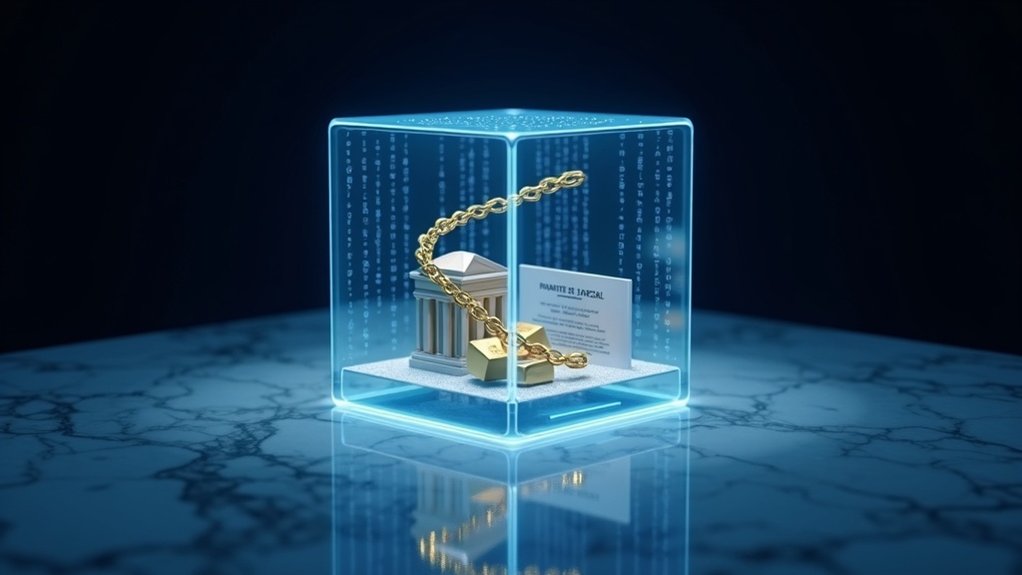Fiat cryptocurrency blends government-backed money with blockchain technology. It’s digital cash controlled by central banks, not physical bills. Unlike Bitcoin, it maintains stability through government oversight. Transactions happen faster than traditional banking, with every move tracked on a digital ledger. Privacy? Not really. These currencies sacrifice decentralization for legitimacy and control. They’re not the revolution crypto-anarchists wanted. The financial world evolves, but governments aren’t giving up control that easily.
What happens when government-backed currency meets blockchain technology? You get fiat cryptocurrency, a digital currency that blends traditional government control with cutting-edge blockchain capabilities. It’s like your regular dollar went to tech school and got an upgrade.
Unlike Bitcoin and its decentralized friends, fiat cryptocurrencies remain firmly under central bank control. These digital currencies exist solely in electronic form. No physical bills to lose down the couch cushions. They represent the same value as traditional currency but operate on blockchain or similar distributed ledger technology. The result? Faster transactions, greater transparency, and fewer midnight calls to your bank’s customer service.
While Bitcoin runs wild, fiat crypto keeps a government leash—all digital, same value, but with blockchain superpowers.
Central banks love them. Obviously. Fiat cryptocurrencies give governments the same economic control they’ve always had—managing inflation, setting interest rates, and generally keeping their fingers in the financial pie. But now they’ve got fancy new tools to do it with. When economic storms hit, central banks can intervene just like they do with paper money. Users can access their funds through hot wallet systems that provide convenient real-time transactions and management capabilities.
The stability factor is huge. While Bitcoin rides the financial rollercoaster, fiat cryptocurrencies maintain relative stability backed by government authority. Their value doesn’t randomly drop 30% because some tech billionaire tweeted something cryptic. They’re designed to be boring. Financially speaking, boring is good. Unlike decentralized cryptocurrencies, these government-backed digital currencies can help authorities better manage recession and inflation.
In practice, these currencies facilitate everything from buying coffee to international wire transfers. They provide the financial system flexibility that was a key motivation for moving away from the gold standard. They’re already being tested in various countries as Central Bank Digital Currencies (CBDCs). The technology enables smart contracts and automated systems that traditional banking can’t match.
Unlike their decentralized cousins, fiat cryptocurrencies aren’t anonymous. Every transaction leaves a digital footprint. Great for stopping criminals. Not so great for privacy enthusiasts. They operate through authorized intermediaries rather than peer-to-peer networks.
The bottom line? Fiat cryptocurrencies represent the uncomfortable marriage of government control and blockchain innovation. They sacrifice the rebellious spirit of cryptocurrency for stability and legitimacy. It’s not the financial revolution crypto-anarchists dreamed of, but it might be the evolution that actually sticks.
Frequently Asked Questions
What Are the Tax Implications of Investing in Fiat Cryptocurrencies?
Investing in fiat cryptocurrencies triggers various tax obligations. The IRS treats them as property, not currency.
Every sale, trade, or use for purchases creates a taxable event. Gains get taxed as capital gains—short-term at ordinary income rates (10-37%), long-term at lower rates (0-20%).
Starting 2025, exchanges must report all transactions. The IRS is watching, folks. Blockchain analytics make hiding transactions nearly impossible.
Better track those cost bases and holding periods.
Can Fiat Cryptocurrencies Be Used to Circumvent International Sanctions?
Yes, fiat cryptocurrencies can be used to dodge sanctions. They operate on blockchains that bypass traditional banking systems where sanctions are enforced.
But it’s not exactly foolproof. Major stablecoin issuers implement KYC and AML procedures—not exactly criminal-friendly.
Blockchain’s transparency is a double-edged sword; transactions leave permanent trails. Governments aren’t stupid either—they’re developing sophisticated tracking methods.
The cat-and-mouse game continues, with regulators constantly adapting to close loopholes.
How Do Fiat Cryptocurrencies Impact Traditional Banking Systems?
Fiat cryptocurrencies shake up traditional banking big time. They reduce demand for national currencies and shift liquidity to crypto exchanges—not great for banks’ stability.
Banking’s middleman role? Under threat. Blockchain enables direct peer-to-peer transactions, bypassing SWIFT and other slow, expensive systems.
Banks aren’t sitting idle, though. Many are developing crypto custody services and adopting blockchain tech themselves. It’s adapt or die.
Regulatory uncertainty doesn’t help matters. The financial landscape is changing, whether banks like it or not.
What Privacy Concerns Exist With Government-Backed Digital Currencies?
Government-backed digital currencies create major privacy headaches.
Unlike cash, every transaction is traceable by authorities. Central banks get unprecedented access to citizens’ spending data. Goodbye, anonymity.
Critics warn this threatens civil liberties – the government knowing what you bought, when, and where? Creepy.
These currencies could enable mass surveillance or even programmed spending restrictions. Technical safeguards exist, but the fundamental issue remains: Big Brother gets a front-row seat to your financial life.
How Will Fiat Cryptocurrencies Affect Global Economic Inequality?
Fiat cryptocurrencies could cut both ways for global inequality. They might help the unbanked access financial services and reduce remittance fees.
But let’s be real—digital divides exist. No internet? No crypto. Period.
Wealthy nations will likely dominate this space. Their currencies becoming digital won’t magically fix systemic problems.
In unstable economies, foreign digital currencies might undermine local monetary control. Great for avoiding hyperinflation, terrible for sovereignty.
The tech is neutral. The power structures aren’t.









